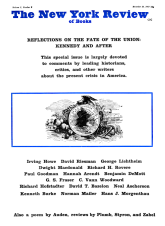London, November 25—The disaster which has struck the United States is going to be felt beyond its frontiers, and this not just for the obvious reason that people everywhere have been shocked and stunned. It is a necessary consequence of this miserable catastrophe that the impetus given during the last three years to the closer integration of the Western world is going to be lost. The already dangerous rifts in the Atlantic alliance are certain to be deepened.
It is as well to be prepared for this to happen, just because for some time it will not be apparent on the surface. The decencies will be observed. Public men on both sides of the Atlantic will affirm their mutual confidence in each other. Ordinary people will hope for the best. If increasing numbers of influential people in Europe, in all walks of life, are now going to write American leadership off as a lost cause, they will not, for the time being, go out of their way to make this plain to Americans, or even to their own countrymen. In public, the rhetoric of Atlantic solidarity will continue unchanged. In practice, Europe and America may well drift apart.
It might seem extravagant to attach such far-reaching significance to what, after all, may look like a catastrophic accident. Doubtless it appears so to Americans. It cannot have quite the same meaning for Europeans, already conscious of a drift which the late President had been trying to stop. What happened in Dallas on November 22 must confirm the doubts of all those who had never quite believed that America was ready for world leadership. General de Gaulle is now in a position to say: “I told you so.”
These remarks may seem unfair, but it is well to face the truth that this is how the matter looks to Europeans. President Kennedy—if an outsider may be forgiven for saying so—had raised American politics above their usual level. He had thereby earned the respect and confidence of America’s allies all over the world. That confidence has now suffered a blow from which it will take a long time to recover.
The circumstances of the crime do not rank foremost in the mental picture which people in Britain and elsewhere have formed of the United States this weekend. Kennedy’s assassination may have been the work of a madman or a fanatic, but its consequences stem from a logic not dependent on the behavior of the political lunatic fringe. It does not matter much whether the assassin turns out to have been a kind of Van der Lubbe, the Dutch anarchist who in 1933 singlehandedly fired the Reichstag (contrary to all the political legends spun at the time). What matters is that his crazy deed should have fitted into the picture which people here had begun to build up of America: the image of a country which seems to be drifting into violence over its unsolved racial problem. The British public has been told this weekend that white Southerners were celebrating the President’s murder. Thus the assassin’s bullets have struck at us all.
The Atlantic Alliance can only hold together if America plays the part in it that Britain used to play in Europe. This requires a stability which seems to be lacking. Stability does not exclude rapid and profound social change—on the contrary. What it excludes is murderous irresponsibility and the growth of racial and political fanaticism. The United States this week does not look like the kind of country that can lead a world alliance. That, to an observer located in London, is the prime lesson of the event.
This Issue
December 26, 1963



